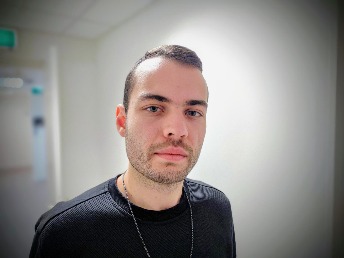Introducing: PhD Orfeas Koidis is working on sanctions and cryptocurrencies

Russia, Iran, North Korea: the world has sanctions on many regimes. Russia is removed from the western banking system. Cryptocurrencies may be providing an opportunity for these countries to avoid the sanctions. How? Orfeas Koidis hopes to find an answer. The coming four years he will work as a PhD in Groningen, studying Illicit Trade. He is member of Illicit Trade of the Rudolf Agricola School for Sustainable Development.
Promoters of mr. Koidis are dr. Francesco Giumelli (Arts,International Relations and International Organization) and Dr. Oskar Gstrein (CF, international law).
International relations and law
What did you study?
‘I started studying International Relations at the Panteion University of Athens. But after my bachelor's degree, I switched to law, which has always been my passion, and obtained my Masters in International Trade and Investment Law in Amsterdam.’
Sanctions and cryptocurrencies form a broad topic, so where to start?
“While sanctions are a largely studied topic the imapct that cryptocurrencies may have on them has not been studied yet. The subject is very contemporary and that’s what makes the research fascinating. It’s in a sense pioneering and there’s of course the hope my findings will lead to solutions in the future.
There’s also an other sustainability side to cryptocurrencies: estimates show that the total global electricity usage for crypto-assets are between 120 and 240 billion kilowatt-hours per year, a range that exceeds the total annual electricity usage of many individual countries, such as Argentina or Australia.
‘We don’t know what the future will bring for crypto. China is now working on an alternative for the Western banking system. That could make crypto less important or obsolete as states might be trying to maintain their relevance and control in a system that appears to be transitioning towards more decentralized governance.
ICOG
Koidis now works at The Groningen Research Institute For The Study Of Culture (ICOG). Specifically, he is interested in assessing the ability of states to utilize cryptocurrencies as an avenue for sanctions evasion and in exploring the impact, if any that cryptocurrencies have on sanctions effectiveness. This research project sits at the crossroads of International Relations and law.
The interdisciplinarity of the project gives rise to questions of both legal nature, such as the impact of cryptocurrencies on fundamental rights and jurisdiction as well as of socio-political nature pertaining to more complex concepts such as the balance of power and the potential erosion of hegemonic systems.
You will also be a part of the Illicit Trade group of the Agricola School. It provides you an opportunity to work interdisciplinary. What disciplines might be of help to your research?
‘Well, working with researchers from other disciplines is always beneficiary for my work. Specifically, IT computer scientists and economicst are people with whom I would like to maintain a close relationship as they can help articulate complex technological or economic concepts. Lawyers and political scientist are the ones with whom I am most engaged with due to the existence of common research interests. However in an interdependent world all disciplines come together and you never know when a discussion will spark a new thought process that will stimulate your research.’
And the final question of course: do you yourself invest in cryptocurrencies? Koidis smiles: ‘Yes, I do. But not as an investment. Stocks are a far better investment. But by investing in cryptocurrencies I might be able to learn more about the unique nature of the cryptocurrency market and its differencies to the fiat currency system.
| Last modified: | 02 June 2023 2.32 p.m. |
More news
-
04 July 2025
University of Groningen awards various prizes during Ceremony of Merits
The UG awarded different prizes to excellent researchers and students during the Ceremony of Merits on 4 July 2025.
-
02 July 2025
Relinde Weil reappointed as a member of the Supervisory Board UG
The Minister of Education has reappointed Relinde Weil for a second term as a member of the Supervisory Board of the University of Groningen.

